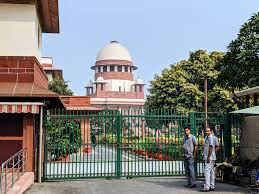The learned Single Judge of the High Court had set aside the award6 of the Tribunal[Award dated 27.08.2003. 7 Central Government Industrial Tribunal-cum-Labour court]. Vide the aforesaid award, the prayer of the workman was accepted, and order dated 05.12.1984 deeming that the workman had voluntarily retired, was set aside. He was directed to be reinstated with full back wages along with interest and consequential benefits. (Para 2)
A person aggrieved by the order of transfer cannot sit at home and decide on his own that the order is illegal or erroneous and he will not comply with the same. If the workman had any grievance, he could have availed of his remedy available against the same; otherwise, he was duty-bound to comply with the same. Failure to avail of any remedy also would mean that he had accepted the order and was duty-bound to comply with the same. At a later stage, he could not take a plea that the order being erroneous, no consequence would follow for its non-compliance. _(Para 10)
His over-smartness is evident further from the contents of his letter where he claimed that as a consequence of non-payment of subsistence allowance, he had to pass his life on open road and his address for communication had been lost, thus making sure that he could take a plea that none of the communications from the Bank were received by him. (Para 12)
The aforesaid communication from the workman clearly establishes the fact that he was in the know of the letters issued by the Bank to him regarding his voluntary absence from duty for over 90 days. He was directed to report for duty to the Manager, Branch Office, Bhagwantnagar, Unnao vide order dated 28.09.1983, but instead of submitting his joining, he continued corresponding with the Bank. (Para 12)
The aforesaid conduct of the workman itself was sufficient to non-suit him as has rightly been done. His argument that being on suspension, he could not have been treated to have been voluntarily retired as per the deeming provision, is merely to be noticed and rejected, as during his suspension also, the relationship of master and servant does not come to an end. All the rules and regulations governing the post continue to apply. Merely because the Bank had stopped paying subsistence allowance to the workman does not mean that the workman was no more an employee of the Bank. The action was taken by the Bank only to ensure that somehow or the other, the workman joined his duty. (Para 16)
SUPREME COURT OF INDIA
2023 STPL(Web) 483 SC
[2023 INSC 1077]
U.P. Singh Vs. Punjab National Bank
Civil Appeal No. 5494 of 2013-Decided on 14-12-2023
https://stpllaw.in/wp-content/uploads/2024/01/2023-STPLWeb-483-SC.pdf







